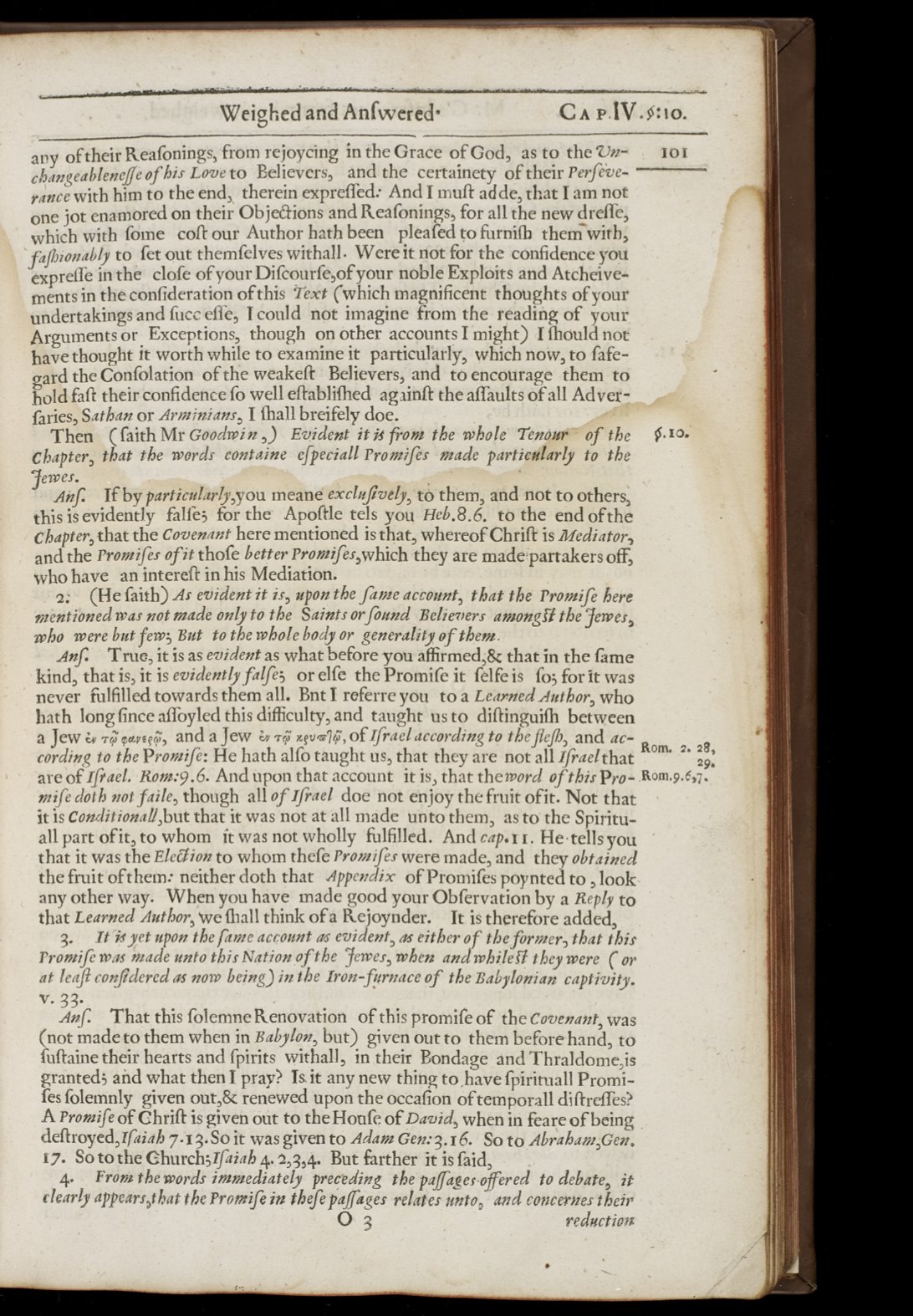

Weighed
and
Anfwered
CA P.IV.4:10.
any
of
their
Reafonings, from rejoycing in
the Grace
of
God,
as
to
the Vn-
lot
changeableneffe
of
his Love
to
Believers,
and
the
certainety
of
their
Perfive-
rance
with
him
to
the end,
therein
expreffed: And I muff
ad
de,
that
I
am
not
one
jot
enamored on
their
Objections and Reafonings, for all
the
new dreffe,
which with force
colt our Author hath
been pleafed
to
furnifb
themwith,
fafhionably
to
fet
out
themfelves withall.
Were
it
not
for
the
confidence you
expreffe
in
the
clofe
of
your Difcourfe,of your noble Exploits and Atcheive-
ments
in
the
confideration
of
this
Text
(which
magnificent
thoughts
of
your
undertakings
and
fucc effe,
I could
not
imagine from
the reading
of
your
Arguments
or
Exceptions, though on
other
accounts I
might)
I fhould
not
have thought
it
worth
while
to
examine
it
particularly,
which
now,
to
fafe-
gard the Confolation
of
the
weakeft Believers, and
to
encourage
them
to
hold
fail
their
confidence
fo
well eftablifhed againít the
affaults
of
all
Adver-
faries, Sathan
or
Arminian,
I
(hall
breifely doe.
Then
(faithMrGoodwin,)
Evident
it
is
from the whole
Tevour
of
the
Chapter,
that
the
words
containe
efpeciall Promifes made
particularly
to
the
yewes.
Airf.
If
by
particularly,you
meane
exclufavely,'to
them, and
not
to
others,
this
is
evidently felfe; for
the
Apoftle tels you
Heb.8.6.
to
the
end
of
the
Chapter,
that
the
Covenant
here mentioned
is
that,
whereof
Chrift
is
Mediator
and the
Promifes
ofit
thofe
better Promifes,which they are
madepartakers
off,
who have
an
intereft
in
his
Mediation.
2:
(He faith)
As
evident
it
is,
upon
the
fame
account,
that
the
Promife here
mentioned
was
not made
only
to the
Saints orfound
Believers
amongft the
Jews,,
who were
butfew;
But to
the whole
body
or
generality
of
them.
Anf.
True, it
is
as
evident
as
what
before
you
affirmed,&
that
in
the
fame
kind,
that
is,
it
is
evidently
falfe;
or
elfe
the Promife
it
felfe
is
fo;
for
it
was
never
fulfilled
towards them
all. Bnt
I
referre you
to
a LearnedAuthor,
who
hath
long
lince affoyled
this difficulty,
and
taught
us
to
diftinguifh
between
a
Jew
w
TW
a ue4m
",
and
a
Jew
T
e oo7Ç,
of
Ifrael
to
the
flefh,
and
ac-
Rom. 2. 28,
cording to
the Promife:
He bath
alfo
taught
us,
that
they are
not
all
/five/that
29.
are
of
Ifrael. Rona:9.6.
And upon
that
account
it
is,
that
the
word
of
this
Pro-
.Rom.9.6,7.
wife
doth not
faile, though
all
of
Ifrael doe
not enjoy the fruit
ofit. Not that
it
is
Conditionall,but
that it
was
not at
all made
unto
them,
as
to
the
Spiritu-
all
part
of
it,
to
whom
it was
not wholly
fulfilled. And cap.] r.
He
tells
you
that
it
was
the
Eleilion
to
whom thefe
Promifes
were made, and they
obtained
the fruit
of
neither
doth that
Appendix
of
Promifes
poynted
to
,
look
any
other
way.
When
you
have made good your
Obfervation by
a
Reply
to
that
Learned
Author,
we
(hall
think
of
a
Rejoynder.
It
is
therefore added,
3.
It
teyet
upon
the fame
account
as
evident,
as
either
of
the
former,
that
this
Promife
was
made unto
this
Nation
of
the
7eroes,
when
andwhilell
they were
(or
at
leaf%confdered
as now
being)
in the Iron
furnace
of
the
Babylonian
captivity.
v
Anf.
That
this folemne
Renovation
of
this
promife
of
the
Covenant,
was
(not
made
to
them
when in
Babylon,
but)
given
out to them
beforehand,
to
fuftaine
their hearts
and
fpirits
withal],
in
their
Bondage
and Thraldome,is
granted; and what then
I pray?
Is it
any new thing
to,have
fpirituall
Promi-
fes
folemnly given
out,&
renewed upon
the
occafion
oftemporall
diftreffes?
A
Promife
of
thrift
is
given
out
to
the
Houfe
of
David,
when in feare
of
being
deftroyed,ifaiah 7.13.Soiit
was given
to
Adam
Gen:
3.16. So
to
Abraham;Gen.
17.
So
to
the Church;ifaiah
q,.
2,3,4. But
farther
it
is
faid,
4.
From
the words immediately preceding the paffagesojfered
to
debate,
it
clearly appears,that
the Promife
in
thefepaffages
relates unto,
and
concernes
their
0
3
reduction










